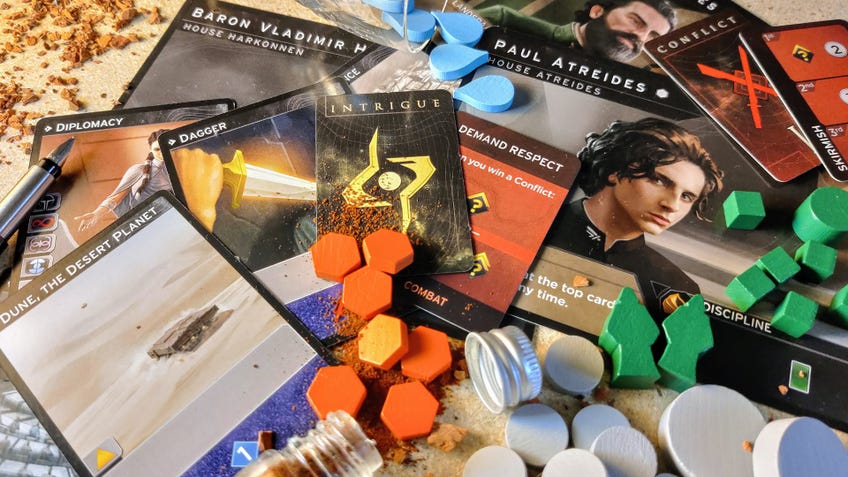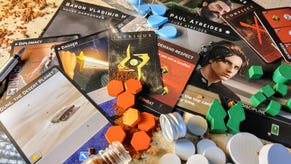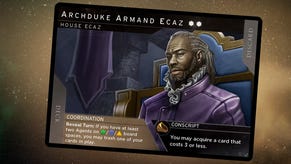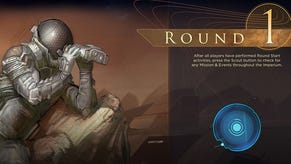Dune: Imperium board game review - a hearty stew of deckbuilding and worker-placement that’s light on spice
He who controls ten victory points, controls the universe.
Frank Herbert’s Dune is an enigmatic beast. An extremely influential pillar of the sci-fi genre yet somewhat cult in its following, its adaptations have all had somewhat curious fates. Of three attempts to bring it to film only David Lynch’s 1984 effort reached screens, only to be shredded by critics. Attempts at video games in the nineties and noughties were a mixed bag, with even the well-received entries fading to obscurity. There was even a TV mini-series featuring James McAvoy that I’d never heard of.
Arguably then, it’s on the tabletop that Dune has enjoyed its most successful adaptation. Rare copies of the long out-of-print 1979 board game often sold for hundreds of pounds on the secondhand market before a new edition released in 2019. With this curious lineage behind it, how does designer Paul Dennen’s Dune: Imperium, the latest attempt to capture Herbert’s Dune-iverse, measure up?
Splicing together two extremely familiar mechanics, Dune: Imperium is a surprisingly straightforward game given the complexities of other entries in the franchise. Players race to 10-plus points through a mix of worker-placement and deckbuilding, with games lasting around an hour-and-a-half.

Each round players dispatch agents to action spaces on the board, scooping up resources, faction influence or troops. Culminating each round is a conflict that rewards players based on their combat strength, built up through a mix of spent troops and revealed cards.
It’s a satisfying puzzle of gauging when you can grab rewards in the early game while making sure you’re prepared to contest bigger rewards in the final rounds.
It’s advisable to pick up at least a few points from conflict rewards, though it’s not a game of trying to win every fight and you will need to scoop up points elsewhere. Overcommitting one round can leave you under-resourced the next. I was slightly disappointed there isn't more clever subterfuge involved. Arctic Scavengers, one of the early pioneers of the deckbuilding genre, featured a similar conflict phase with a way for players to bluff about their strength, potentially deterring others from trying to fight - something that would have suited the Dune theme nicely. While there are intrigue cards that can be revealed for last-minute bonuses, this feels more like luck of the draw than player cunning. Even so, it’s a satisfying puzzle of gauging when you can grab rewards in the early game while making sure you’re prepared to contest bigger rewards in the final rounds.
The bulk of actual play involves deciding where to send your agents as determined by the cards you’ve drawn. Dispatching an agent requires you to play a card with a symbol matching the space you want to send them to. Rather than playing all your cards at once, play passes around the table with each player taking a single action on their turn.
Once you’ve dispatched all the agents you wish to or you’ve run out (you begin the game with only two), you take a ‘reveal’ turn, revealing all remaining cards in your hand and gaining their reveal effect: typically persuasion, a resource used to purchase new cards or additional combat strength. Each turn you’re deciding which cards you want to spend to dispatch agents and which you want to hold back for their reveal rewards.
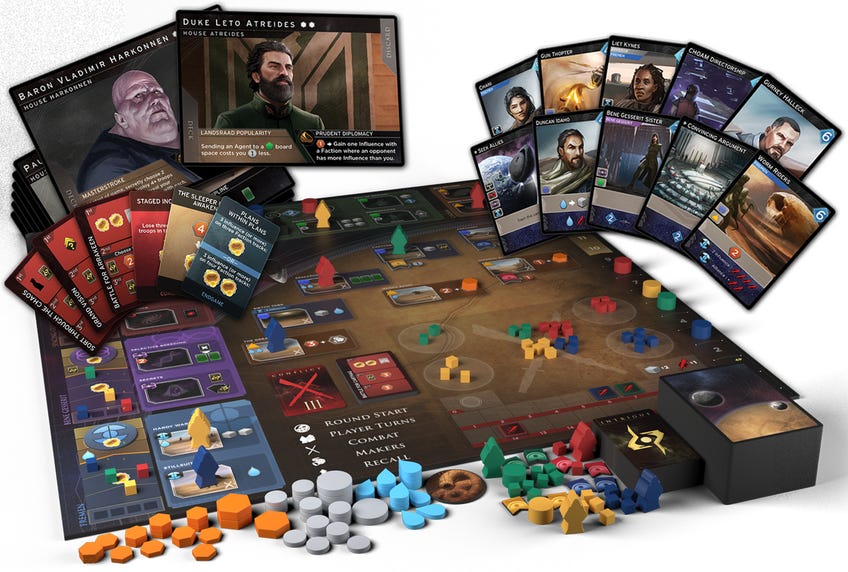
This is not an insular experience where you can sit back and focus on your own little plan. Competition for board spaces and the lure of conflict rewards ensures players are constantly jostling each other. This does create potential for analysis paralysis as, even if you’ve got a clear plan for the round, other players will get in the way and you’ll have to channel your inner mentat to recompute your course on the fly.
Dune: Imperium isn’t particularly difficult to teach; there’s just a lot of it to explain.
Dune: Imperium isn’t particularly difficult to teach; it's just there’s a lot of it to explain relative to how straightforward the core of the game is. This is largely due to a handful of rules and exceptions that can easily fall through the cracks of your brain. That said, they’re generally small things that someone will ask about in the first round. For the most part, the complexity of Dune: Imperium is getting a feel for all of the actions available to you. For new players, being confronted with a choice of 22 different action spaces to which you can dispatch agents is a little daunting. Getting to grips with what you should be doing on any given turn is good fun. Despite being a competitive game there was certainly a collective sense of exploration as my brother and I stumbled our way through the first game.

Given we’re dealing with hostile natural forces of our own right now and social distancing is paramount, it’s extremely fortunate that Dune: Imperium features solo and two-player variants. To ensure that the board remains just as crowded as it does at three and four players, the game subs in AI to provide a pseudo three-player game. When playing with two, the AI’s only function is to occupy board spaces and provide extra competition in the conflict phase. In single-player, however, the AI get their own character powers and can score victory points ensuring that you still have to be the first to 10 or more points to win the game. My first few solo games were pretty tough; it felt like the AI were always racing ahead of me. After a few three- and four-player games the tables were turned and I managed some convincing wins. Without other players to take cards from the market and bring in fresh replacements, the choice of cards available to build your deck is frustratingly constricted. It seems like this is a problem people have noticed, with some fixes already suggested on BoardGameGeek. I don’t think Dune: Imperium has won me over to solo board gaming just yet - the experience just made me miss having other players at the table.
Imperium manages to combine worker-placement and deckbuilding in a way that just works - even if it’s not particularly flashy.
The deckbuilding side of things in general is a bit limited - I don’t think you should look to Dune: Imperium if that’s the sort of experience you’re after. Your starting deck is ten cards and you draw a new hand of five every turn. You’ll probably cycle your deck three or four times during the maximum 10 rounds the game can last, so the more powerful cards you acquire later in the game might only see play once or twice. As you get more familiar with the game you will start to try and keep your deck lean, grabbing the extremely rare opportunities to trash a card and being selective about what you add. Chasing the satisfaction of a well-built deck is an uphill struggle and by the time you reach it the game will often be in its closing round. Of the cards available in the box there aren’t as many as I’d like that actually combo together and, as with so many things, variety is the spice of life.

Dune: Imperium is a satisfying sum of its parts, the snags disappearing as the pieces smoothly come together, at least mechanically-speaking. In some places the game’s ludonarrative is almost an inversion of the Dune universe. Harvesting spice is supposedly a dangerous affair as sandworms are attracted by the vibrations of the harvesters. Here, spice is as easily acquired as any other resource and the process of harvesting it scares them off.
Though the game is well-produced the visuals stop short of being particularly inspiring or evocative. With the release of Denis Villeneuve’s Dune film postponed, the art loses some of its context. You’ll draw a new card and wonder why you're looking at a softly rendered picture of Josh Brolin, the celebrity of the actors outshining the characters we have yet to see them portray. The theme just feels a little thin - instead of Bene Gesserit plots and elusive ecologists, you’re left with Timothy Chalamet chasing timidly shy melange.

Despite this, I find myself liking Dune: Imperium. It manages to combine worker-placement and deckbuilding in a way that just works - even if it’s not particularly flashy. While I’d love to see an expansion to bulk out the number of potential card combos in the game, for now at least I’m still enjoying exploring what the game has to offer. Though there’s nothing of interest in how the game wears its theme, it does serve as the game’s unique hook.
Perhaps then they’re a perfect pair. The lure of Dune attracting people to a solid game that might have gone unnoticed in a crowded market, while the familiarity of staple worker-placement and deckbuilding mechanics help ground the somewhat esoteric franchise.
When I come to think about who this is for, it’s a tricky one. If you want a game that really excels at any one part of Dune: Imperium’s mélange à trois, you should look elsewhere. But if, like me, you tend to avoid more traditional conflict-light economic games, it might be the perfect way to sneak a bit of worker-placement into your collection. Within the canon of Dune adaptations, it will likely join James McAvoy’s performance as Leto Atriedes II in relative obscurity - doing little to offend or delight fans in either measure, the revered status of its tabletop predecessor remaining just out of reach.
